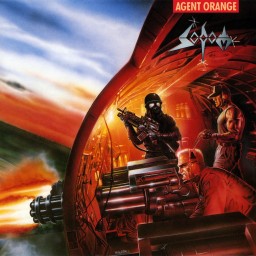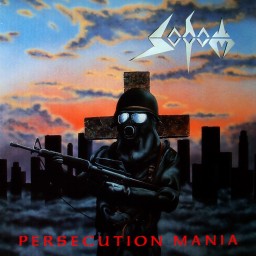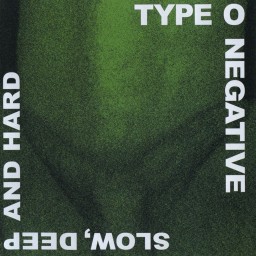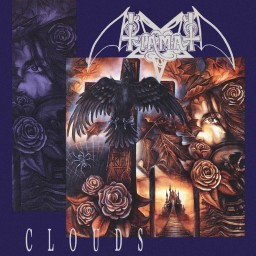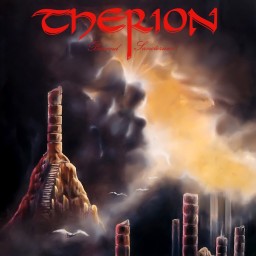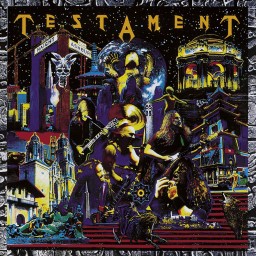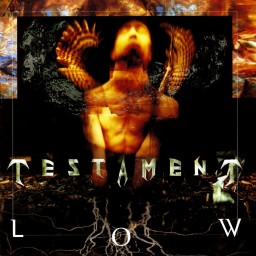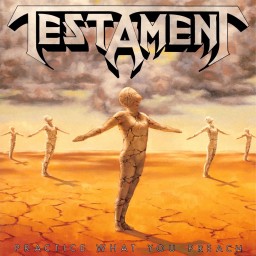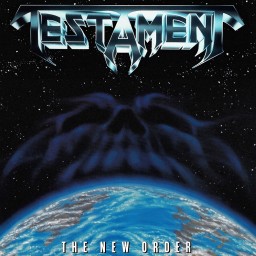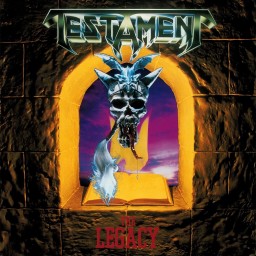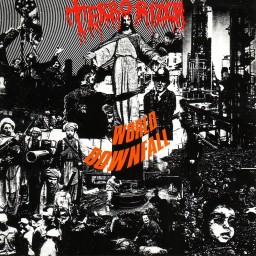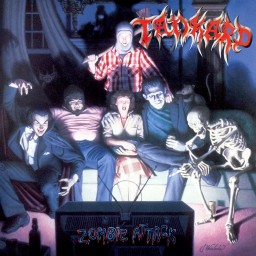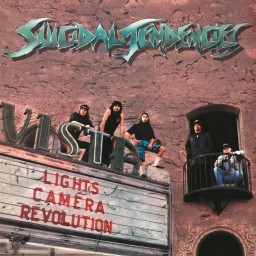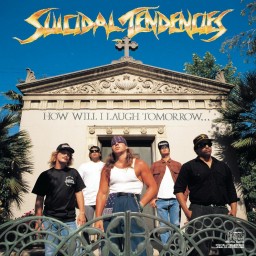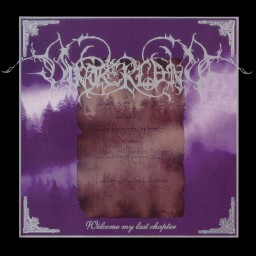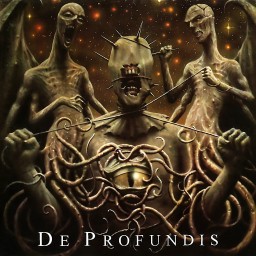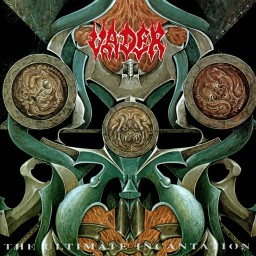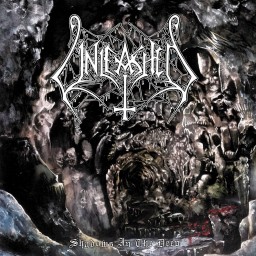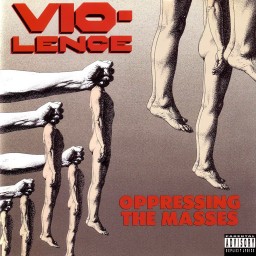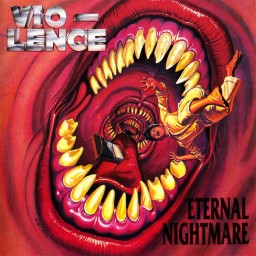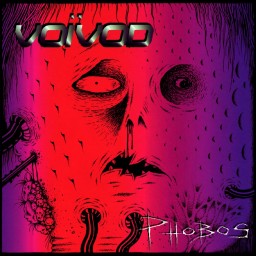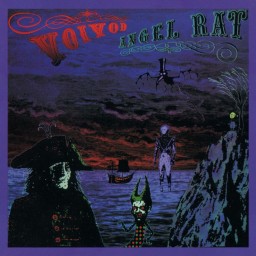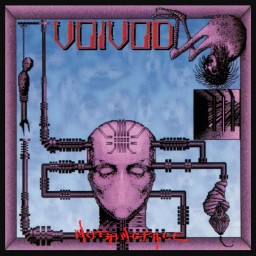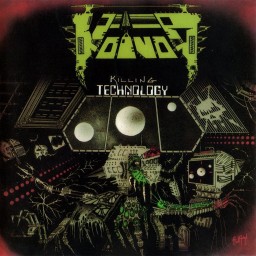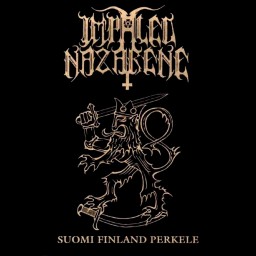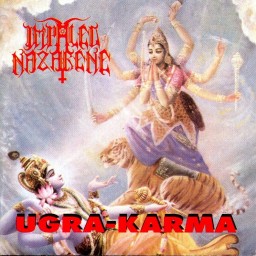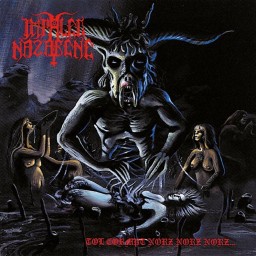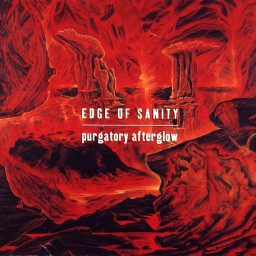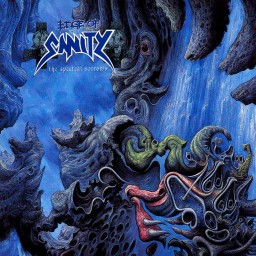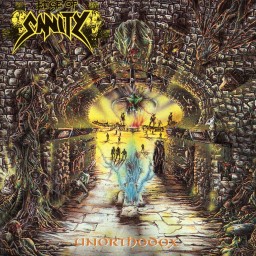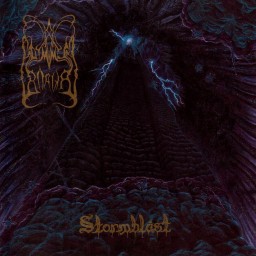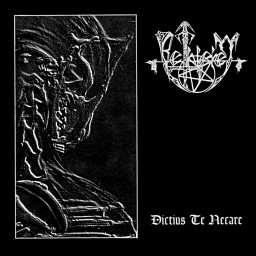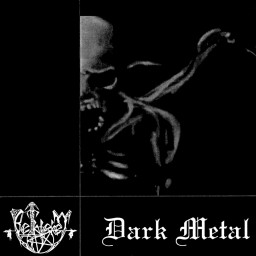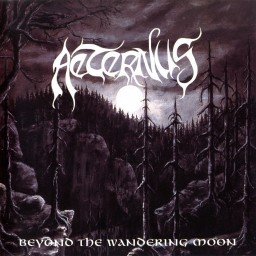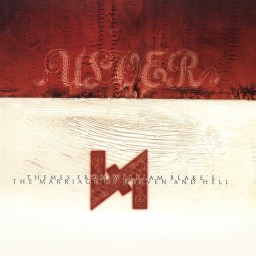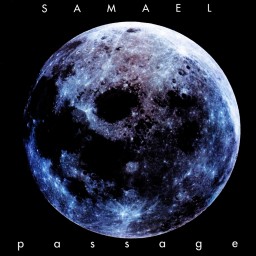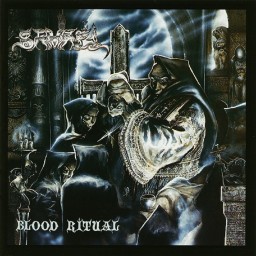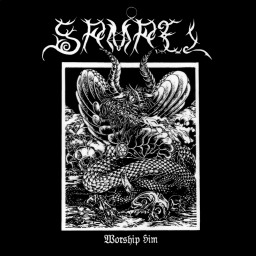Ben's Reviews
Agent Orange is a solid thrash album from these German legends, but it's nothing amazing. The title track is killer, that's for sure. There are a bunch of other tracks that are enjoyable too, such as Tired and Red and Remember the Fallen, but just as on Persecution Mania, there are a couple of tracks that let the album down, stopping me from calling it an absolute classic. Ausgebombt, while being a fan favourite for some reason, is extremely simple and not very interesting at all. The final track and cover song Walk Away is terrible. It's completely out of the spirit of the album and just not very well performed.
All up I'm going to give Agent Orange a generous 4. I don't see it as the masterpiece of thrash that others do but it's an entertaining release that's worthy of some attention.
Genres: Thrash Metal
Format: Album
Year: 1989
Persecution Mania is where Sodom really hit their straps. While their earlier work has a certain charm, it's messy and immature at times. This album displays a more fine-tuned performance and kept Sodom in touch with bands such as Kreator and Slayer in a time when thrash was hitting its straps. Speaking of Slayer, it's clear that Reign in Blood influenced these German's between the debut full length and this one. Just check out Enchanted Land for complete Slayer worship.
While I do find the album in general to be really entertaining, it is a little bit up and down in quality. Nuclear Winter, Electrocution and Christ Passion are classic, yet Iron Fist, Conjuration and the close of Bombenhagel are less successful. But all up, Persecution Mania is a solid 4-star classic thrash album!
Genres: Thrash Metal
Format: Album
Year: 1987
This is such a strange album. There are only 6 tracks (plus The Misinterpretation of Silence and its Disastrous Consequences which is humorously just a minute of silence), each running between 6 and 12 minutes in length. On each of these tracks I can find sections that I thoroughly enjoy. Type O Negative know how to create atmosphere when they put their mind to it and some of the doom sections are great. There are other rock parts that get me nodding my head and remind me of the greatness that Type O Negative would reach with their gothic rock in years to come. There's even an awesome 6-minute instrumental (Glass Walls of Limbo) complete with low chanting vocals and sound effects that could fit on any good dark ambient album. So, there's a lot that I like here!
But then there's so much that I really don't enjoy. These tracks move from doom to rock to a sort of sleezy punk sound that just about ruins everything. I know that this band (and Peter Steele's previous thrash band Carnivore which I can still hear in this release) have always been somewhat sleezy, with stupid cheesy lyrics, but I find it really annoying on Slow, Deep and Hard because I can hear so much potential for an album that I would love. I guess if I hadn't heard the band's more recent albums before giving this a spin, I'd probably see it differently. As it is, I don't think I'll listen to it all that much.
Genres: Doom Metal Gothic Metal
Format: Album
Year: 1991
Tiamat's evolution began as a straightforward death metal band, then moved through to soft death doom metal, and finally onto the goth pop that they currently release to the masses. Clouds is certainly a transitional album between the rather average death metal of the early days and the more doomy, atmospheric period of Wildhoney. If there's one word I can use for this album straight off, I would say intriguing. There are some beautiful melodies, catchy choruses and a variety of styles within almost every track. Keyboards are used sparingly and quite well too, adding to the atmosphere of it all. But probably due to its transitional nature, Clouds often comes across as awkward and at times downright cringeworthy.
It probably doesn't help that I first came to Tiamat through Wildhoney, which is an exquisite album that manages to mix atmospheric, tender sections with doomy riffs and growls with ease. Clouds doesn't manage this mix as well, with below average vocals (Johan Edlund's clean vocals are just not very good at this stage and his accent comes across as just humorous at times) and some very mediocre sections mixed in with all the above-mentioned creativity. All of this adds up to an inconsistent, yet somehow entertaining experience. In a Dream, The Sleeping Beauty and Undressed are the better tracks on the album, but all the remaining tunes have their moments.
Final Note: I'm a bit baffled as to why so many RYM users keep labelling this as Death Metal. Don't be fooled into thinking this sounds anything like Obituary or Deicide etc. It's Death Doom Metal mixed with Gothic Metal. At the most, Death Metal might be listed as a secondary genre but that's even a stretch.
Genres: Doom Metal
Format: Album
Year: 1992
I certainly wouldn't claim to be a Therion expert, but I can say that everything I had experienced from them prior to Beyond Sanctorum had next to no resemblance to death metal. I'd heard that their early albums were much heavier than their current gothic symphonic metal approach, but I guess I never expected it to be this intense. Beyond Sanctorum is Swedish death metal in the style of Entombed, Dismember and a whole bunch of other bands that come from Stockholm. But Therion clearly weren't happy to just replicate their countrymen's achievements and added a whole bunch of other influences throughout the 10 tracks.
The tracks that are more straight forward death metal such as Future Consciousness, Illusions of Life and Tyrants of the Damned are nothing all that special to me. Other bands do this style with far more success and with a superior production. It's when they let their creativity run free with the wonderful Symphony of the Devil and the epic The Way where Therion displayed what they were truly capable of. Symphonic elements, various speeds and hugely memorable riffs combine to produce stunning results. I also find a great deal of enjoyment in Cthulhu with its crunching discordant riffs and doomy sections, but unfortunately, at this stage of their career, the band were just not consistent enough to hold my attention for the whole album. Beyond Sanctorum shows definite promise, but with a little more focus and a better production, could have been a more enjoyable experience. I don’t know at what stage Therion left the death metal behind, but I plan to give their next couple of releases a spin to find out.
Genres: Death Metal
Format: Album
Year: 1992
Flawless performance, good track selection and powerful production. Live at the Fillmore is how all good live albums should be.
It's not often I check out live albums. I generally prefer the more complete and "as it was meant to be" experience of studio albums. All this said, there are certainly some bands that really know how to perform when it counts, and Testament would have to be one of those bands. The other reason why Live at the Fillmore is a more interesting proposition to me personally is because I enjoy almost everything they've ever done to some degree. Even the albums that others don't particularly rate such as Souls of Black and The Ritual had roles to play in my teenage years, with many nostalgic feelings associated with them. The line-up here may not be the classic Testament blueprint, with Louie Clemente and Alex Skolnick missing, but their replacements do a fine job indeed. James Murphy is probably one of the only guitarists in metal that could possibly fit snugly into the shoes of someone as talented as Skolnick.
The track listing is good and it's not surprising that they decided to focus on their earlier material rather than on the more recent hit and miss work. In fact, 12 of the 14 live tracks are taken from The Legacy, The New Order and Low, meaning there are only 2 tracks (Souls of Black and Practice What You Preach) representing their other 3 albums, with nothing at all coming from The Ritual. This is a little disappointing for someone who likes all their albums but completely understandable considering the general preferences of most of their fans. Probably the only Testament track I can think of that's very obviously missing is Disciples of the Watch (probably my favourite Testament moment), but I can't complain too much as there are simply no bad tracks to be found amongst the ones they chose.
The crowd is clearly into the band and the performance is very close to flawless. Testament have always been tight, and they were right on the money during this recording. The sound is crystal clear and there's enough power to make you feel part of the concert. If anything, Chuck Billy's vocals are even better live, and he raises the aggression levels to new heights. Tracks such as Apocalyptic City are so much more intense with this recording than in their original state making Live at the Fillmore more than just a "best of" collection. To finish things off, as if 14 well performed and crushing live tracks weren't enough, the band also included 3 acoustic studio recorded tracks. Return to Serenity, The Legacy and Trail of Tears were all partly acoustic to begin with, but these versions are entirely so, with female backup vocals added for extra ballady (there's a new word for you boys and girls) effect. They're all enjoyable but probably not entirely essential when one considers the hour of live destruction that precedes them.
Genres: Thrash Metal
Format: Live
Year: 1995
A groovier, heavier Testament, but a slightly disappointing album.
Testament were right up there with my favourite bands in the late 80s. The New Order was awesome, and I even found some enjoyment to be had in albums that others don't appreciate such as The Ritual. But I remember distinctly being quite disappointed with Low and I still feel that way today. Sure, the band added a fair amount of groove and a powerful production to this album and Chuck Billy's vocals have never been this aggressive and awesome, but many of the songs just fail to make their mark on me.
This is all made even more surprising when I consider that the ever-reliable James Murphy took over on guitar (from the also godly Alex Skolnick) for this album. While there are some obvious Murphy leads on a couple of tracks (particularly on Urotsukidoji), for the most part he doesn't really stand up and be counted the way he normally does on that front. This is still a Testament album though, and there are still numerous good tracks such as Low, Hail Mary and the brutal Dog Faced Dogs. But the album falls away towards the end, with none of the last few tracks making any sort of impression. All up, Low is a slightly above average album that should have been more given all the ingredients.
Genres: Thrash Metal
Format: Album
Year: 1994
Along with Metallica's "And Justice for All" album, Practice What You Preach is what got me into metal in the first place. It's therefore quite hard for me to listen to it now without getting all nostalgic. If I ignore those feelings, I must admit that it’s not one of the greatest metal albums ever released, no matter what I thought of it when I was 13 years old. It's not even the best Testament album. Objectively, Practice What You Preach is a lightweight thrash album, not coming close to the Kreator / Slayer end of the thrash spectrum. It is entertaining though, with a whole bunch of memorable tracks, especially the title track and The Ballad.
Once again Alex Skolnick's guitar is nothing short of breathtaking and Chuck's in fine form on the vocals front. The lyrics, if a bit contrived at times, are relevant and intelligent, and all up Practice What You Preach is a perfectly good introduction for anyone that enjoys some heavy music but doesn't want things to get too chaotic. Which is probably why I found it so appealing when I was a young lad. I've moved onto much more extreme pastures since then, but I'm sure this album will continue to make me smile and nod my head for years to come.
Genres: Thrash Metal
Format: Album
Year: 1989
Without a doubt the best Testament album, The New Order played a large role in my teenage years. While it was Practice While You Preach that first drew my attention, this was the album that made me absolute love this band. It's true to say that a big reason for that is due to the fantastic thrash metal song writing that the band produced with tracks like The New Order, Trial by Fire and Disciples of the Watch. But I have to say the main reason is due to the exquisite guitar work on this album, especially by Alex Skolnick. Listen to the instrumentals Hypnosis and Musical Death for examples of just beautiful guitar playing.
But I'll be the first to admit that The New Order isn't a perfect album, nor is it worthy of 5 stars. The first 6 tracks are quality, but then it loses its intensity with The Preacher, Nobody's Fault and A Day of Reckoning dropping the ball slightly. In particular, the Aerosmith cover Nobody's Fault, while being a decent enough cover, stands out like a sore thumb on this album. I don't like covers if they are going to shift the intensity and atmosphere of an album and this is a perfect example of that happening.
All this said, I still love The New Order and listen to it often, even after 30 years. Oh man that makes me feel old! 30 Years!!!!!!!!
Genres: Thrash Metal
Format: Album
Year: 1988
Testament were always one of my favourite bands back in the early 90s, but I must admit not appreciating this album as much as I should have. While I was totally into The New Order and Practice What You Preach, I didn't give this one much of a listen.
Going back to it over the last few weeks has been a reawakening. While thrash was in its infancy back in 1987, this album was amazingly mature. Perhaps some of the lyrics were not so, but musically this album was up there with Slayer and Metallica for raw talent. Over the Wall, The Haunting, Alone in the Dark and Apocalyptic City are all fantastic, but there really aren't any bad tracks on The Legacy. As usual, Skolnick and Peterson are awesome on guitar and Chuck Billy rocks out in his inimitable style.
This is not Testament's best album, but as a debut release and considering the year it came out, it's a damn fine album with some classic tracks and great performances.
Genres: Thrash Metal
Format: Album
Year: 1987
I know how important this album is. It's certainly one of the earliest grindcore albums along with Carcass, Repulsion and Napalm Death's work. It's also got some great musicianship, particularly by Pete Sandoval on drums from Morbid Angel. Some riffs are excellent and there are bunch of tracks I really dig, particularly After World Obliteration, Storm of Stress, Fear of Napalm, Enslaved by Propaganda, Dead Shall Rise and World Downfall. The problem with the album though is that after about 15 minutes all the tracks start to blend together. If I listen to 2 or 3 tracks, I think they're quite cool. But if I listen to the whole album straight, it just gets boring. The song structures and vocal patterns are similar throughout.
All up I think these guys found a great sound that would influence heaps of bands, and there are sections on World Downfall that are to be enjoyed, but this is just not an overly amazing album for me.
Genres: Grindcore
Format: Album
Year: 1989
I'm afraid this is not my thing at all. It reminds me a lot of Nuclear Assault with all their apparently humorous, punk influenced thrash metal. I can't stand Nuclear Assault for more than about 3 tracks and Tankard's debut album is even worse. It just gets so terribly boring due to every track sounding almost identical. The riffs are simplistic, the drums completely uninspired and the whole feel to the album is just monotonous to the nth degree.
I can't say I've heard any other Tankard releases, but I find it hard to believe they would find any real interest in producing this sort of music for the 20 plus years they have been in existence. I assume the alcohol that these German dudes are so obsessed with keeps them going somehow.
Genres: Thrash Metal
Format: Album
Year: 1986
It's always surprising to hear just how much Suicidal Tendencies rock out when everything comes together. It's easy to put them in the punk / crossover box and then suddenly, there's this chunky riff and lead work to die for that reminds me that in their prime, these guys knew exactly how to write perfectly good thrash metal. Unfortunately, there are always parts of their albums that just don't sit too well with me and stop me from loving any of their releases from start to finish.
Lights Camera Revolution is a perfect example of the above. You Can't Bring Me Down, Lost Again and Alone start things off in fine style and I'm totally into it. But then the silliness starts with tracks like Lovely and Send Me Your Money and it just loses something for me. I'm sure there are a bunch of crossover fans out there that dig both sides of the band, but I guess I'm just not one of them. But if I took the heavier tracks off How Will I Laugh Tomorrow and Lights Camera Revolution, I reckon I'd have one kickass album. Mike Muir's distinctive vocals are a little unusual (they're wussy at times), but he's got great range and a bunch of talent to go. Rocky George pumps out great riffs and leads throughout and Robert Trujillo shows why he'd eventually be handpicked for Metallica on bass.
All up I'd say this is probably my favourite Suicidal Tendencies album, yet I still can't rate it too highly. At times it's fantastic, but it's just not consistent enough to reach higher grades from this thrash head.
Genres: Thrash Metal
Format: Album
Year: 1990
This album caught me by surprise. I found just about nothing of interest on the self-titled release that everyone obsesses about. I guess I'm just not interested in punkish hardcore or skater music and so it was a sound I just couldn't relate to. So, I turned to How Will I Laugh Tomorrow expecting to hate it. How wrong I was!
This album is a thrash metal album! And I mean real thrash metal! Of course, some of the former Suicidal Tendencies feeling is still hanging around, but the riffs and song structures are pure thrashing gold at times. Most of all though, these songs are extremely memorable and entertaining. There are a few songs I still struggle with a bit, but Trip at the Brain, Hearing Voices, How Will I Laugh Tomorrow, Surf and Slam and If I Don't Wake Up are damn great. I'm glad I got past my ST prejudice and gave this album a shot. I better check out some of their others now.
Genres: Thrash Metal
Format: Album
Year: 1988
Heavily influenced by other Swedish bands, but still a very good melodic black metal album.
Vinterland are one of those bands that released one heavily praised album before disappearing off the scene entirely. A couple of members have in recent years appeared in other bands such as The Black and Tyrant, but until the recent announcement that Vinterland are now officially reformed, Welcome My Last Chapter was (and still is as the time of this review) the only recording fans have to enjoy. Interestingly, the album was originally called Wings of Sorrow, but the confusion caused by having Welcome My Last Chapter written at the bottom of the album cover caused the band to change its name. I’d come across the band’s name and positive reviews of the album many times before I finally decided to see what all the fuss was about. The answer is melodic black metal very much in the vein of Swedish country mates Dissection. I can hear other Swedish bands such as Mork Gryning (particularly on Still the Night is Awake) and even Katatonia, but Dissection is clearly the biggest influence. The question is always going to be “can Vinterland compare to the lofty heights of The Somberlain or Storm of the Light’s Bane”? They come close for sure, but they just fell short in my opinion.
Vinterland do have a lot to offer though and certainly shouldn’t be considered a second-rate Dissection with nothing worthy of your attention. The melodies are great throughout the album, the production is strong, and they inject piano and acoustic sections successfully and seamlessly to keep things both interesting and atmospheric. The vocals are pretty standard black metal fare but are perfectly adequate for this style of music. If anything, Vinterland come across as a bit more brutal than Dissection when they get going, but I think this is more to do with the drum sound than the material itself. The blast beats and double bass kicking are very powerful and wouldn’t be out of place on a death metal album. I think the drums are one of the weak points of Welcome My Last Chapter. Strange, considering how good they are in general, but I swear the drummer screws up and loses time at regular intervals. It doesn’t ruin the experience of the album but it’s certainly distracting.
Dan Swanö apparently handles keyboard as a guest musician, but really doesn’t have a big role to play. The symphonic aspect is pushed to the background and the only time they really step up is on the instrumental So Far Beyond, which is performed by Jonas Hermansson instead. It’s strange to find such a creative and excellent musician in such a secondary role, but in the end, Vinterland is all about cool, icy melodies and there are plenty to be enjoyed here. Whether the band are ripping through tracks like Our Dawn of Glory, Still the Night is Awake and A Vinter Breeze, or slowing things down such as on As I Behold the Dying Sun and Vinterskogen, there are multitudes of beautiful yet dark melodies that will make you come back for more. After all the hype I’ve read over time regarding Welcome My Last Chapter, it was always going to be tough for it to live up to it. After spending a couple of weeks letting it get under my skin, I can honestly say that it doesn’t disappoint. With a bit more time I might increase my rating but for now it’s a solid 4 and a big recommendation for any fans of melodic black metal.
Genres: Black Metal
Format: Album
Year: 1996
Vader's best album with numerous classic tracks. This is pure, exciting death metal from a legendary band.
Vader's De Profundis album is generally considered their best work and I'm not going to disagree. While the band have been very consistent throughout their lengthy career, they haven't released an album that surpasses this one when it comes to sheer excitement and entertainment. The Vader style hasn't changed all that much since to be honest, but their production has become clinical and precise to the point where it lacks a little of the raw venom that death metal thrives on. De Profundis has a far more organic sound and a greater level of urgency than albums such as Litany or Impressions in Blood, no matter how technically fantastic those releases are. Every aspect of this album is exactly how it should be on a successful, brutal death metal album and therefore marks the highlight of their discography.
A highlight on all Vader releases prior to 2005 must be Doc's drumming. Just as Dave Lombardo manages with Slayer, Doc always had an incredible ability to get the absolute most out of his drumkit. There was never a stage where he was just backing up the rest of the band. His double bass kicking, blast beats and fills are all first rate and immensely powerful, without ever becoming overbearing. His death was a huge loss to both the band and metal in general. The riffs throughout the album are fantastic and remind me of the more shredding side of Morbid Angel with just a touch of thrash. They keep the velocity high and crank riff after riff at the listener while never breaking the momentum. Peter's vocals have always been up there with my favourite in the genre. His always distinguishable yet ever aggressive style is damn perfect for creating memorable and brutal death metal.
It's hard to criticise the album for a lack of variety when it only has a running time of 34 minutes and contains so many mosh-worthy sections. Tracks such as Silent Empire, Blood of Kingu, Sothis and Reborn in Flames are right up there with the best the band have ever produced and none of the remaining pieces are any less intense or worthy of getting excited about. De Profundis deserves its reputation as one of the better death metal albums of its time and Vader's peak performance.
Genres: Death Metal
Format: Album
Year: 1995
Vader were the first big death metal band from Poland but certainly not the last. Their clinical yet thrashy approach would be emulated by many over the years, but rarely bettered. Many have mentioned the Slayer influence below and that can be heard, but the full tilt drumming and death growls take this to a whole new level of brutality and into the realms of death metal. The other thing that Vader manage to achieve is a level of grace and epic atmosphere that can only occur when bands take what they do very seriously.
Doc's drumming is awesome throughout and China and Peter's riffs are consistently great as are Peter's brutal vocals. But to be honest, Vader haven't really changed all that much over the years. The production on their albums has become more and more clean and clinical, but the blueprint was formed right here on The Ultimate Incantation. Tracks such as Dark Age, The Crucified Ones, Final Massacre and Breath of Centuries are right up there with the bands best work. Basically, if you appreciate good, tight death metal without bells and whistles, then there's absolutely no doubt that The Ultimate Incantation will get you banging your head.
It's also worth mentioning that this album cover was done by the brilliant Dan Seagrave, although I have to say, it's not one of his better works.
Genres: Death Metal
Format: Album
Year: 1992
This was a tough period for a whole heap of death metal bands, particularly those in the Swedish death metal style. After an initial onslaught of excellent albums from Entombed, Grave, Dismember and Unleashed, they would all have to work hard to keep the momentum going. With so many albums sounding so very similar, just releasing another straightforward album wasn't going to be quite enough. Unfortunately, I think Unleashed did exactly that. There's almost nothing fresh on Shadows in the Deep! It just takes what they were doing on the first album and runs with it. But while Where No Life Dwells has some classic moments such as Before the Creation of Time and Into Glory Ride, Shadows in the Deep lacks any standout tracks to make it an essential purchase.
All this being said, Unleashed are always good at what they do and this is a solid if not exceptional album. Both groovy and crushing riffs abound, with some decent battle-like atmosphere. I think the highlights for me are when they take their time such as on Shadows in the Deep and Land of Ice. When they go flat out on tracks like The Final Silence and Never Ending Hate, it all becomes a bit monotonous. All up, an acceptable follow up to their debut classic that lacks the creativity or passion to surpass it.
Genres: Death Metal
Format: Album
Year: 1992
Along with Entombed, Dismember and Grave, Unleashed played a massive role in bringing Scandinavian death metal to the world. While each of these bands do have a similar sound, each of them had something interesting to offer. Unleashed's debut album Where No Life Dwells is a brutal affair, with low guttural vocals, relentless drumming and some groovy riffs that contain that trademark dirty Swedish sound that took off around this time.
If anything lets this album down though, I have to say it's the drumming. It's tight, yet monotonous and that one-two style just hasn't aged all that well. There are some attempts to change things up on some tracks so I shouldn't be too harsh. Really though, this is all about the riffs, and there are plenty of crushing sections and memorable grooves to keep me happy. Highlights include Before the Creation of Time, If They Had Eyes, Into Glory Ride and ...And the Laughter Has Died.
Genres: Death Metal
Format: Album
Year: 1991
While stacks of metal fans love Vio-Lence, especially their debut album Eternal Nightmare, there are also a bunch of others that simply find the vocalist far too awful for any enjoyment. I fall firmly within the latter category and no matter how good some of their riffs are, his shocking performance always distracts me and ultimately ruins it all. I think I'm in the minority when I say that Oppressing the Masses is a better album than the debut so-called "classic".
Killian's vocals on this album are a little less painful and at times they are bordering on decent. They’re still distracting though, and I really dislike it when bands (like Exodus) follow up verses with what sounds like the rest of the band calling out a couple of lines simultaneously (gang vocals). Vio-Lence do that in spades! But the riffs are also catchier and more memorable than on the debut, making this album more listenable.
The longer tracks such as I Profit and Liquid Courage are the ones that really get me nodding my head with approval. Vio-Lence could have been so much better had that one member not raised his ugly head.
Genres: Thrash Metal
Format: Album
Year: 1990
This is well played thrash that recalls Exodus and Testament at their most ferocious. It's flat chat for most of the playing time, with high speed drumming and awesome riffs one after another. So why can I only give Eternal Nightmare 3 stars instead 4 or 5. The answer is simple I'm afraid. This vocalist is terrible! Embarrassingly awful at times! His high-pitched voice is not necessarily the problem. It's his tendency to go up and down and up and down in tone that just gets downright annoying.
It's such a shame because what's on offer here is obviously good. If it had a Chuck Billy or a Tom Araya on vocals I’m pretty sure I'd like this a lot more. I'm not sure how so many thrash metal fans can tolerate them to like this enough to rate it so highly. I just...can't do it!
Genres: Thrash Metal
Format: Album
Year: 1988
A harsher and more focused Voivod that contains some of the band's finest work.
After reviewing this Canadian thrash metal band’s most loved albums, I wasn’t sure whether I was willing to continue my journey down the rabbit hole to work my way through the rest of their extensive discography. On the one hand, albums such as Dimension Hatross and Nothingface contain wonderfully creative and at times truly bizarre science fiction themed thrash metal. But on the other hand, 1991’s Angel Rat and to a lesser extent 1993’s The Outer Limit, had taken the strangeness a little further than I was perhaps willing to go, while also moving away from the harsher thrash landscapes that made the band so enjoyable for me. Considering the critical panning that 1995’s Negatron album received along with vocalist Snake’s departure from the band prior to the recording, I figured it was time to jump this sinking ship before things got well and truly out of hand. Yet I have to admit that almost despite myself, I missed Voivod’s unique sound and found myself drawn back into the fold to find out where their zany adventures went next. I guess with thrash metal seemingly destined to repeat itself, the intentionally distinctive and unapologetically strange world of Voivod fills me with as much intrigue as it does apprehension.
So it was that I chose to venture to Phobos. The word itself has many associations, not least of all being the name for the Greek God of fear, but I think I know which Phobos the guys from Voivod were referring to with their ninth full length album. One look at the album cover (once again created in truly primitive yet striking form by drummer Away) gives the impression that it’s Mars’ closest moon (the other one is called Deimos) that was on their mind. It’s a perfectly fitting subject for the band considering their fascination with all things mysterious and alien and sums up the mood of their sci-fi thrash nicely enough. Speaking of sci-fi thrash, I was delighted to hear on my first listen to Phobos that Voivod hadn’t, as I’d assumed given their previous projection, completely shed themselves of all metal aspects. I figured they’d still be experimenting with weird progressive and psychedelic rock tunes but what I got instead is possibly the darkest and most intense material that these Canadians have produced since their inception. There’s absolutely no doubt that this is Voivod, particularly given Piggy’s unique guitar style, but it seems as though the band reinvented itself while I wasn’t paying attention.
New vocalist Eric Forrest has a much more aggressive style than Snake, yet he strangely manages to sound somewhat similar. If I wasn’t aware of the previous vocalist’s departure, I would have assumed Snake had popped a few angry pills and gone a bit rabid. Away’s drumming has never been overly technical and it’s no different here, but the new production makes his presence felt far more than on previous albums. But as with pretty much everything Voivod has ever done, it’s Piggy that steals the show. His riffs are beautifully discordant as always but there’s a harsher edge to them now that gives Phobos a threatening, ominous atmosphere that I really love. He also adds smatterings of keyboards that increase this atmosphere to stratospheric levels without taking away from the austerity at all. I’m stunned at how good this album is to be honest and Mercury, the title track, Bacteria and Forlorn are some of the very best pieces of work in Voivod’s long history. I’d give Phobos an even higher rating if it didn’t finish so poorly. M-Body has a totally different mood to the rest of the album and stands out like a sore thumb, and the less said about the King Crimson cover the better. But it’s easy to press stop after track 11 and the preceding hour is consistent and typically alien Voivod magic.
Genres: Industrial Metal Progressive Metal
Format: Album
Year: 1997
Worthwhile for Jack Luminous, but this is Voivod-lite.
It took me a long time to get into Voivod in the first place. Their sci-fi themed thrash metal was totally alien to my ears and it took quite a few listens to all the earlier albums before they began to click. Once they did though, the tracks worked their way into my psyche and all the bizarre riffs and wacky vocals just made sense. By the time The Outer Limits was released, the band had settled down into far less metallic, much more fluffy sounding entity. That's not to say that this doesn't sound like Voivod because I guess the evolution was gradual enough for instant recognition. But I have to say I miss the thrashing edge and moments of complete spasmodic madness that sat alongside all the catchiness on albums like Dimension Hatross and Nothingface.
Still, I can't say that I don't enjoy The Outer Limits. There may be several average tracks that don't really do much for me, such as Moonbeam Rider, Time Warp and Wrong Way Street. But Fix My Heart, Le Pont Noir and The Nile Song are all thoroughly entertaining, and likely to stick in your mind for days. Then there's Jack Luminous! This 17-minute track is one of the greatest moments in these crazy Canadians long and distinguished career. Not only is it the thrashiest track on the album, but it moves from fantastic riff to fantastic riff for almost the entire running time. Absolute highlight in my opinion! If you're into Voivod, then there's no reason not to give this a shot. For anyone that doesn't know the band and wants to know what this is like, then the only comparison I can make is another insane Canadian musician, Devon Townsend.
Genres: Progressive Metal
Format: Album
Year: 1993
It always takes me a while to enjoy Voivod's albums. They're so strange that it generally takes about 5 or 6 listens before I can come to grips with everything going on. Once they get under my skin though, there's no getting them out. As much as I tried to like Angel Rat, and I knew it was going to be difficult from the start, I just can't get into it. It still has its moments of course, as these guys are just too creative to put out a whole album of useless, uninspired music. But as an album following up a massively successful period for the band, Angel Rat is terribly disappointing.
As soon as Panorama kicks in, it's obvious Voivod have taken a lighter, rockier approach. The thrash metal is no longer prominent and the bizarre sci fi imagery has been watered down. Things still get weird and both the music and lyrical content are still straight out of the twilight zone, but it's all just that little bit less intriguing due to the simplicity of it all. By the time The Prow, Best Regards and Twin Dummy have passed by, Angel Rat threatens to drop right off the radar. But I do enjoy a couple of the tracks towards the end of the album, especially Golem, which is Voivod the way I like them. Full of discordant riffs, computerised vocals and completely unique melodies. Unfortunately, there aren't enough of these moments on the album to put this anywhere near these Canadian's best work.
Genres: Progressive Metal
Format: Album
Year: 1991
Once again, this Voivod album takes quite a few listens to get under your skin. But just the like the two preceding it (Killing Technology and Dimension Hatross), once it manages to sink in, there's no escaping its charm. The bands evolution continued with Nothingface, moving away from the bizarre, punky thrash they started with, moving gradually towards a bizarre, punky, thrashy, progressive, psychedelic rock style that they made their own. Confused? So was I!
As always, the two major things of note on this album are Piggy's and Snake's vocals. Piggy had such a unique style of playing that was extremely creative and controlled by no real metal boundaries. There are no shredding or chunky riffs, just fascinating little segments one after another that connect with you on about the 4th or 5th listen. Snake's vocals have lost all the edge to them by now, with only the cleanliness remaining. If I'd heard these vocals in another band, I'd probably think they were terrible. But in Voivod, they are strangely perfect and suit all the alien shenanigans going on around them.
Overall, I think this album is not quite as good as Dimension Hatross but on par with Killing Technology. I am yet to experience any other Voivod releases but will certainly endeavour to do so at the nearest opportunity.
Genres: Progressive Metal
Format: Album
Year: 1989
Voivod are a tough band for me. It seems I need to give their albums an awful lot of spins before they get their hooks into me. During the first few listens I can't quite get past the rather punkish style that emanates throughout. The sound of Killing Technology is rather raw and when combined with Snake's loose style of singing and the bands tendency to shift chaotically multiple times during tracks, it tends to leave me struggling to get a grip. But Piggy's discordant guitar riffs keep me coming back for more until suddenly it all seems to make more sense.
That's not to say that I think Killing Technology is an excellent album. It's a decent album that more than anything displays the promise of Voivod which they would soon fulfil. Tracks like Killing Technology, Forgotten in Space, Ravenous Medicine and This is Not an Exercise are genuinely enjoyable. The rest have neat moments, but they clash with awkward sections that don't stand up quite as well. All up this album is a fascinating release that doesn't quite gel into a classic for me. Close but not quite.
Genres: Progressive Metal Thrash Metal
Format: Album
Year: 1987
Another overrated Impaled Nazarene album that has very little to enjoy.
I'm sorry to poo-poo all over everyone’s party but Impaled Nazarene are hugely overrated. I simply can't get over how highly these albums are rated. For starters, these guys obviously never really gave a crap about what they were releasing. The first two albums were filled with idiotic moments and despite what many seem to think out there, don't remotely approach anything resembling darkness or evil for a second. On every Impaled Nazarene album there are tracks they showcase what the band can do when this tired formula kind of clicks (particularly on Ugra-Karma). They occasionally come up with a decent riff and hold it for a few minutes while the drummer goes nuts and Mika screams over the top to create mildly entertaining pieces of work. But the rest of their albums are filled with either entirely repetitive, boring black metal or atrocious attempts to branch out into electronica or rock n roll.
Suomi Finland Perkele does nothing to change my mind. While Steelvagina (yes, more immaturity on display) is perfectly decent and Blood is Thicker Than Water manages to work, despite its total lack of black metal, there is nothing else on the album worth remembering. Total War - Winter War has a couple of minutes of the band shouting "do you want fucking war, yes we want fucking war". Let's Fucking Die is terrible rock n roll with lyrics as stupid as the title suggests. With so much incredible black metal out there to listen to, why would anyone want to keep listening to albums like this one. The only truly great thing I can say about Suomi Finland Perkele is that it only runs for around thirty minutes. But that's half an hour more than I'm willing to waste on this album ever again.
Genres: Black Metal
Format: Album
Year: 1994
Overrated black metal silliness that's at least an improvement over the debut.
Impaled Nazarene were amazingly prolific in their early years, releasing 3 full length albums within 2 years. But it's not hard to see how they managed that when the music they created didn't really push the boundaries of creativity. Tol Cormpt Norz Norz Norz introduced the band to the world with all their hateful aggression, but it must be said that the debut was filled with corny nonsense and repetitive structures. Ugra-Karma came along just 10 months later and as that suggests, didn't have a lot else to offer. It does however manage to be more entertaining and slightly less silly (and I mean slightly), but once again this album is massively overrated.
If you take tracks like The Horny and the Horned, Sadhu Satana and Hate by themselves, they are quite enjoyable, somewhat brutal black metal with dark riffs, intense, relentless drumming and venomous vocals spat out over the top. But it all becomes so stale and repetitive by about halfway through the album's thankfully short running time. Sure, they tried to change it up with the atrocity that is Gott Ist Tot (a simply terrible attempt to add an electronic element) but Impaled Nazarene are a one trick pony I'm afraid. I'm giving it a very generous three stars as it is an improvement over the debut and mildly entertaining in small doses.
Genres: Black Metal
Format: Album
Year: 1993
I recall thinking Impaled Nazarene were cool back in 1993 when I was 16 years old. They brought a certain tasteless, hardcore nastiness to black metal that appealed to my teenage mindset. But over the years I've come to see the band as more and more of a joke and found less and less things to enjoy on these early albums. When I listen to Tol Cormpt Norz Norz Norz these days, all I can hear is repetitive structures, high levels of immaturity and cheesy imagery, with the occasional entertaining track. I don't mean to sound arrogant, but I think as my musical development expanded over the years, the more this style of music lost its appeal.
Impaled Nazarene do indeed play black metal, but it's massively infused with punk attitude. It's relentless in its approach and all starts to sound the same very quickly. One of the bands strengths is also its weakness, being Mika's vocals. His style is immediately recognisable and at first his raspy, venomous shouting seems to work well over the repetitive riffs and constant barrage of drumming. But he just does the same thing over and over on every track until it becomes extremely tiresome. When combined with all the cheesy backing sound effects (including admittedly humorous goat noises), crappy "Satanic" roars and pointless 20 second tracks, I find it very hard to take any of this even remotely seriously. A lot of reviewers below use words like evil, hatred, Satanic etc., but there is nothing very dark or evil about Impaled Nazarene because it's entirely a piss-take. Just as Venom did in the early 80's, these Finnish youths are clearly just having a laugh and that's apparent in the result.
Genres: Black Metal
Format: Album
Year: 1993
Another flawed yet entertaining Edge of Sanity album filled with variety and melody.
I find Edge of Sanity albums to be a little difficult at times. I've recently reviewed Unorthodox and The Spectral Sorrows and found in both cases albums that have some wonderful music, but that also contain sections that simply make me cringe. I guess it comes down to the fact that Dan Swano is simply not willing to lay down 10 tracks of one-dimensional melodic death metal. His music crosses genres often and he lets his creative juices run no matter where the result takes these albums. Purgatory Afterglow is without a doubt a better album than its predecessors, but I still can't give it more than 4 stars due to some little annoyances.
Let's look at the song Silent for example. Starts off nice enough with a little melody before kicking in with some fast drumming and a great riff. Around the minute mark, acoustic guitars take over for just a few seconds before another awesome riff takes off and Dan's growls launch over the top. The chorus is simple but effective and so far, I'm totally into this track! Then suddenly there's this simply horrible (and I mean frickin’ disgusting) cheesy little melody that kicks in around the halfway point. It's gone within 30 seconds but it all but destroys what is otherwise an awesome track. This may seem like a petty complaint, but I continually find this happening throughout the album and it leaves me contemplating how awesome this album could have been with just a little bit of restraint.
It should be obvious that I find Purgatory Afterglow to be a little frustrating at times, but there's still enough great music for me to recommend it to anyone into the melodic side of death metal. Twilight, Of Darksome Origin, Elegy and Velvet Dreams are all damn enjoyable and almost all the other tracks (Song of Sirens and Black Tears excluded) have great melodies and riffs at some point. I do find it difficult to understand how anyone can rate this album above the amazing follow-up Crimson, but then that's the beauty of opinion.
Genres: Death Metal
Format: Album
Year: 1994
After enjoying Edge of Sanity's previous release Unorthodox quite a bit, I was chomping at the bit to give The Spectral Sorrows a listen. While it does indeed evolve the band's sound towards the brilliant high of 1996's Crimson album, its progression from that earlier release probably isn't as far as I'd expected. The melody is definitely cranked up a notch and the production is given a massive boost, but otherwise the underlying sound is pretty similar. The down-tuned, Stockholm grown, yet melodic riffs combined with Swano's fantastic death growl and splashes of creativity is what Edge of Sanity are all about and this album delivers as expected.
Strangely enough though, and seemingly against the average fan, I think I like Unorthodox a bit more. The Spectral Sorrows is a good album that lacks any classic tracks, whereas Unorthodox contained a few rippers like Enigma and When All is Said. The Spectral Sorrows is also a little bit more experimental, which while certainly not being a bad thing in general, doesn't always work in this case. Blood of My Enemies has a very different sound that fits much better on a Bathory (Viking metal period) release and just seems out of place smack bang in the middle of this album. Sacrificed fares a little better with its gothic rock tone that somehow manages to be quite entertaining.
But when the band knuckle down and do what they do best, The Spectral Sorrows shines well enough to be a worthy listen for any fan of their later work. There are 13 tracks (including a very atmospheric intro and outro), so even though a few of them don't sit terribly well with me, there is plenty on offer here. Highlights for me are Darkday, Lost and On the Other Side.
Genres: Death Metal
Format: Album
Year: 1993
I always assumed that Edge of Sanity's earlier albums would contain none of the amazing song writing and melody that runs through their better albums. Crimson I and II are two of the finest records you'll ever hear but seeing an Edge of Sanity album labelled simply as death metal set off alarm bells for me. Surely without all the captivating progressiveness and catchy melodies, Unorthodox wouldn't be as enjoyable. While that's turned out to be true, I'm glad I checked this album out regardless.
Unorthodox is rooted in the Stockholm death metal tradition as every second album of this time seemed to be, yet Dan Swano and co. added doses of creativity and variety to an otherwise stock standard model. That Swedish death metal guitar sound is present, but it's mixed in with both changes in tempo and a whole bunch of melody. Check out the 7-minute epic Enigma for a cracking track. Filled with atmosphere, some clean vocals, multiple instruments, awesome death metal riffs and growls, I think this is one of my very favourite tracks ever! Unfortunately, while the rest of the album is solid, it rarely approaches this brilliance again. Closing track When All is Said, with its slow crushing presence and beautiful leads, is probably the only other track that comes within reach of this early set benchmark, but that's not to say that there's nothing else of note here. Every track is solid enough death metal with some interesting drumming and great vocals and riffs.
If anything, Unorthodox suffers from being a bit too long. At near an hour running time and 14 tracks, it could have done with a little fine tuning. But I have found it to be thoroughly entertaining and feel the above rating of around 3.5 is slightly underrating it. I guess if you compare it to some of Edge of Sanity's other albums, it's hard not to downgrade it. But taken in its own context, Unorthodox is a fine album and certainly worthy of your time.
Genres: Death Metal
Format: Album
Year: 1992
A slightly dodgy production is made up for by some very enjoyable symphonic black metal.
Dimmu Borgir seem to be given an awfully hard time in the metal community. It's a classic case of what we Aussies call tall poppy syndrome. As soon as something becomes successful and mainstream, we tear it down and stamp on it. It's like everyone wants to have their own private obsessions that no-one else knows about and I for one find it pathetic. Who cares how popular a band are if what they are producing is entertaining and at times, ground-breaking?! Anyway, back when Stormblast was recorded, Dimmu Borgir hadn't even remotely approached the mainstream and were producing rather lo-fi yet still symphonic black metal. Their debut For All Tid was a bit disappointing on the song writing side, not to mention the poor production and dodgy musicianship that stuck out regularly. Stormblast went a long way to correcting these issues, but unfortunately, they couldn't entirely eradicate them.
On the negative side, the production still has a lot to be desired. It's a bit weak and murky and some of the instruments (such as the piano) come across as tinny, losing a lot of their effect. On the positive side, the song writing improved a lot between the two albums. It's still quite lightweight, not really trying to inject the sort of venom and darkness that infuses so many other black metal entities. If I had to compare it to another album released around the same time, I'd say Arcturus' Aspera Hiems Symfonia. That album is far more entertaining and musically challenging, but both contain fairly harmless black metal (by that I mean not particularly brutal), a similar symphonic aspect and both suffer from a less than powerful production. Yet despite all this, Stormblast is very nice to listen to with some beautiful music, cool melodies and nice black metal riffs.
There are no 5-star masterpiece tracks on Stormblast, but it's all rather solid, with Broderskapets Ring, Når Sjelen Hentes Til Helvete and Guds Fortapelse being the highlights for me. Dimmu Borgir would change dramatically between this album and Enthrone Darkness Triumphant, which would cause the band's popularity to skyrocket. But don't assume everything the band recorded before that classic should be ignored. Stormblast is an enjoyable symphonic and melodic black metal album that hints at the potential these Norwegians contained well before they adorned thousands of t-shirts across the globe.
On a side note, there was something that bothered me the very first time I listened to this album and has continued to do so right through to today. Track number 4, which is a lengthy piano instrumental, sends immensely nostalgic notions through my brain but I've never been able to put my finger on where this recognition comes from. Over time I've come to believe that this track reminds me of a computer game I played on my Amiga as a kid and while looking on Encyclopedia Metallum today, I have finally been vindicated. Keyboardist Stian Aarstad stole this tune directly from a game called Agony (without permission from the original composer) and I can finally put that little mystery to rest. Plus, it also becomes apparent why Sorgens Kammer was left off the re-recorded 2005 version of this album.
Genres: Black Metal
Format: Album
Year: 1996
Another great Bethlehem album from a musical point of view, destroyed by a spastic muppet vocalist.
I really enjoyed Bethlehem's debut album Dark Metal. The mix of depressive black metal with death doom made for an extremely dark and at times moving release that can be recommended to fans of both styles. I was tremendously excited to hear Dictus Te Necare as its rating on Rate Your Music is higher than the debut, suggesting to any sane person that it is fact a better album. But I'm starting to doubt how much sanity has been involved with the rating of this album, not to mention the album itself. When I listen to the music on Dictus Te Necare, I find the same enjoyment that I discovered on Dark Metal, but it's such a struggle to connect with it for one main reason. The vocals!
I want you to imagine something if you can. Most people reading this review will have heard and probably adored the work of Burzum. There are many reasons why Burzum's works are so loved, but Varg Vikernes' tortured screams on albums like Hvis Lyset Tar Oss are certainly a highlight. His performances are raw and filled with unbridled emotions with the result being incredibly moving. Now imagine if you can what Varg might sound like if he had consumed a couple of bottles of bourbon and was asked to perform his vocal duties while trying to dodge thrown objects from an audience of angry Mayhem fans. Are you having trouble? Well fear not! One listen to Dictius Te Necare will go a long way to describing what this laughable display might sound like.
Landfermann's vocals are so disgustingly awful and distracting that I have to force myself to hear past him to the perfectly adequate music below. In fact, a lot of this album sounds like Dark Metal in style, with black metal riffs making way for slow, atmospheric doomy sections regularly. The tone wouldn't be all that different either if this spastic muppet hadn't vomited all over it. I know there will be plenty out there that think I'm soft cause I can't handle how "extreme" his performance is but it's not a matter of extremity. It's a matter of conviction. Landfermann sounds like he's taking the piss both literally and figuratively and the result is a parody of what black metal stands for. Maybe this was always the intention as Bethlehem seem to enjoy being chaotic and unusual, but I for one don't think comedy has any role to play in the world black metal.
I've given the album plenty of time to sink its claws into me and there's no denying that there's some very nice stuff going on here. I get the most enjoyment out of tracks where Landfermann is kept reasonably in check, such as Tagebuch einer Totgeburt. Die anarchische Befreiung der Augenzeugenreligion would be a stunning track under normal circumstances which reminds very much of My Dying Bride for some reason (I'm sure the main riff can be found in one of their tracks, but I can't figure out which one). Verschleierte Irreligiosität is a re-recording of Veiled Irreligion off the debut so it's an easy way to compare the quality of the releases. Unfortunately, there's no real comparison as the original version is far superior despite the step up in production values. Dictus Te Necare could easily have been another 4 and half stars type album but instead, I'm going to give it a 3 and go in hunt of their next album which thankfully has another new vocalist. Let's hope they didn't pick this one out of the gutter.
Genres: Black Metal
Format: Album
Year: 1996
Dark Metal is a brilliant death doom album with a large dose of black metal influence.
My only previous experience with Bethlehem prior to checking this album out was their most recent outing Mein Weg, which despite the many negative ratings on this very site, I find extremely entertaining. Considering how strange the material is on that album, I guess I didn't really know what to expect on this debut album released 10 years earlier. From looking at the band logo and cover, one can't be blamed for thinking raw black metal, but that's not really an accurate description of Dark Metal. There are elements of black metal to be found, particularly in the vocal and riff department, but this is better categorised as death doom metal which caught me entirely by surprise.
Dark Metal is filled with immense atmosphere, created through extremely moving riffs and melodies, along with some truly great vocals. When the band choose to ramp things up a little (and they never hit high speed), such as on The Eleventh Commandment and Vargtimmen, they still produce some nice stuff, but the longer, more epic tracks are certainly the highlights here. Check out Apocalyptic Dance to find fantastic death doom with all the elements that comes with this emotionally crushing genre. Vocalist Classen switches between raspy black metal vocals and deep death growls, as well as the occasional spoken word section and his performance is totally captivating.
For some reason, even though I've stated this is more doom than black metal, the band that comes to mind often is Shining. I can't help but feel that they were influenced by the total despondency and depressive atmosphere of Bethlehem and the use of varying styles also found its way into the Swedes music. Highlights for me are Apocalyptic Dance, 3rd Nocturnal Prayer and Funereal Owlblood and I can't recommend this enough to fans of melancholic, depressive music, no matter whether they sway towards doom or black metal.
It's also worth noting that despite what the track listing on Rate Your Music states, there are only 8 tracks on Dark Metal. I was originally quite surprised by the running time of the album I'd downloaded, being over 70 minutes, and even more baffled by the final 2 tracks on the album which were of a lesser quality in the song writing department. I've since found out that Supplementary Exegesis and Wintermute are from the 1993 EP Thy Pale Dominion. They're still worth checking out but should not be considered part of the brilliance that is Dark Metal.
Genres: Doom Metal
Format: Album
Year: 1994
A fantastic, not to mention epic, black metal album that deserves more attention.
Many bands start off their career by playing it safe and attempting to replicate already successful templates before finding their own identity on their second or third album. That’s certainly not the case with Aeternus (which means Eternal in Latin for anyone interested). These Norwegian’s spent the first few years of their union creating an original and very atmospheric form of black metal before promptly shedding everything that made them unique and entering the realm of typical, uninspired death metal. Originally a three piece, Aeternus at this stage were made up of Ares (vocals and guitar), Vrolok (drums) and Morrigan (bass and keyboards). Their debut full length album Beyond the Wandering Moon has quite a few things that make it stand out from the pack. Firstly, there really aren’t that many female performers in black metal, so the inclusion of Morrigan (aka Nicola Trier who also played keyboards for Obtained Enslavement around the same period) is if nothing else a novelty. Secondly, and most importantly, Aeternus don’t really sound like other black metal bands.
There are aspects of Beyond the Wandering Moon that are more in line with death metal. Ares’ vocals are low and guttural instead of the usual shrieking or raspy black metal methods. I really like them, and I don’t think they contrast at all with the black metal riffs. It probably helps that the growls are quite low in the mix, meaning they emerge out from within the music rather than dominate over the top of it. The drumming is also fairly death metal in sound with the blast beats having a crunchy and powerful presence. If I had to pick a death metal band that comes to mind it would be Amon Amarth, but that probably has more to do with the mood than anything else. Despite everything I just said, Beyond the Wandering Moon is undoubtedly a black metal album. They utilise repetitious, atmospheric riffs combined with a slight folk element (think Primordial) that make you feel a part of some ancient culture, while the injection of intense faster sections means things never get tiresome. It’s an extremely effective combination and one I wish the band had continued with throughout their career.
If Beyond the Wandering Moon has a flaw, it would have to be the length. It’s not just the fact that the album has a running time of 65 minutes that causes problems. It’s that all 8 black metal tracks (which are neatly bookended by surprisingly beautiful piano and harp instrumentals) have running times of 6 minutes or longer. Some of them are truly worthy of the time allotted to them, but others such as Embraced and Sentinels of Darkness drag on a bit after promising starts. They’re certainly still thoroughly enjoyable, but they probably overstay their welcome. I can’t find much else to complain about here as Beyond the Wandering Moon is a wonderful album. Sworn Revenge, White Realm, Waiting for the Storms and the huge Winter Tale are all breathtaking examples of powerfully moving black metal and, in my opinion, this album simply doesn’t get the attention it deserves. Thankfully Aeternus’ next release (…And So the Night Became) would be of a similar style and quality, giving us fans two very big reasons to be thankful, regardless of the direction the band would take down the track.
Genres: Black Metal
Format: Album
Year: 1997
Possibly too ambitious in scope, Ulver's amalgamation of William Blake and genre blending music is an experience unlike any other.
After the completion of their so-called “black metal trilogy”, I don’t think anyone had any idea what Ulver were going to do next. After all, despite the apparent relationship between their first three albums, the actual content on each varied dramatically. Bergtatt told a haunting fairytale through a mix of black and folk metal, Kveldssanger was an entirely classical acoustic album with no black metal whatsoever, and Nattens madrigal contained an astonishingly raw black metal ferocity that resembled Darkthrone with melodic tendencies. This habitual eclecticism made it next to impossible to predict what this Norwegian outfit had in mind for future outings, but there was little doubt that it would be worth checking out regardless of its genre. A big hint that a massive transformation was underway could be found when inspecting the line-up of the 1998 incarnation of Ulver. Not only were there noticeable changes in personnel, but the remaining members had shed their black metal pseudonyms for either less sinister sounding fictional titles or their actual birth names. Vocalist Garm would now be known as Trickster G., guitarist Lemarchand as Håvard Jørgensen, bassist Skoll as Hugh Steven James Mingay and drummer AiwarikiaR as Erik Lancelot. Second guitarist Aismal was nowhere to be seen, and there was a guy called Tore Ylwizaker listed as “programmer”, along with Knut Magne Valle performing “cables, wires, & sounds”. What the hell was going on?!
As it would turn out, hell was exactly what was going on, along with its heavenly counterpart. Not content with messing around with black metal’s once indelible blueprint, Ulver decided what the world really needed was William Blake’s poetic and philosophical The Marriage of Heaven and Hell recited over layers of electronics, industrial music and avant-garde rock, with a sprinkling of progressive metal and ambience. It’s a completely insane idea which is no doubt why it appealed so much to these musical rebels, and the fact that William Blake himself was considered quite mad throughout his own life would only have added to the appeal. For those unaware of Mr. Blake’s many works, he lived in England between 1757 and 1827, and spent most of his later life creating poetry and illustrations. He is held in extremely high regard for his “expressiveness and creativity, and for the philosophical and mystical undercurrents within his work”, which is not far removed from the feelings I have towards the band Ulver. The Marriage of Heaven and Hell is one of his more famous books and was published as printed sheets from etched plates containing prose, poetry and illustrations, all coloured by his wife Catherine. Its style imitates the biblical books of prophecy, but expresses Blake’s own personal beliefs, while taking numerous digs at other well-known theologians of his time, particularly Emanuel Swedenborg and his work entitled Heaven and Hell.
I won’t feign to understand all of Blake’s writings, but they certainly appeal to my fondness for philosophical and religious based discussion. What initially appears to be some sort of evangelical indoctrination becomes a far more critical and thought-provoking parody of religious thought after repeated readings. Ulver’s Themes From William Blake’s The Marriage of Heaven and Hell was not merely a pathway to an entirely new appreciation of electronic music for me, it simultaneously helped open up a doorway to self-chosen education and thought. It’s no surprise to me that this drastic shift in Ulver’s music and themes was simply too much for a lot of their existing fans, with many of them attacking the band directly for what they considered a betrayal of built up expectations. Somehow, and I don’t wish for this to come across as arrogant, I was not only able to go along for the ride but found an entirely new personal connection with the band that I highly doubt could have been reached had they held their ground. It probably helped that I went into the experience with little to no expectations, after being burnt twice already by the contrasting natures of their previous three releases. All this talk of poetry and intellectual thought, however, is of course no way to base judgement on what is, all things considered, a musical experience. Yet in this instance, it’s difficult to separate the idea from the music, so I can’t help but treat them as one.
The Marriage of Heaven and Hell begins with an argument and while each of the book’s six main sections do the same, only the first is titled as such. The Argument also contrasts greatly with most of the remaining sections, being highly poetic and difficult to decipher as opposed to conversational and comparatively direct. Plate 2 of The Argument seems to be mimicking the book of Isaiah, having a similar ominous tone and language, while Plate 3 is where Blake reveals the almost joking nature of what’s the follow. He mocks Swedenborg for predicting the last judgement would occur in 1757, which just happened to become the year of Blake’s birth, and comments on his own age (33 at the time of writing) being the same as Jesus’ at the time of his apparent death and resurrection. Most tellingly, it is here that Blake suggests religion’s tendency to separate good and evil is a silly concept and writes of other contraries such as attraction and repulsion and love and hate. He derides the idea that the mind and reason and being passive is good and will lead you to Heaven, yet the body and being active is evil and will lead you to Hell. Understanding this argument is the key to understanding The Marriage of Heaven and Hell, just as it is the key to understanding why the members of a former black metal band would show an interest in discussions of angels, heaven and other biblical ideas.
Just as William Blake set the tone with The Argument, Ulver did the same thing with their aural rendition, revealing the sounds and atmospheres that they would then tinker with for the remaining two discs. Plates 2 and 3 are split between three tracks running less than nine minutes in total, and it becomes immediately apparent that Themes From William Blake’s The Marriage of Heaven and Hell is not even remotely close in style or substance to anything Ulver had produced to this point. A highly industrial feel, with shamelessly electronic beats are bizarrely combined with Trickster G.’s numerous vocal variations and more traditional metal instrumentation jumping in and out of proceedings. When I first experienced the album, it was unlike anything I’d ever heard, and I can’t say I’ve experienced anything since that resembles it in the slightest. It does become obvious early on that the music was not created with the lyrics in mind. To put that another way, the mood of the music does not necessarily match the tone of the subject matter, and I’ve always had the impression that Ulver created two discs of music separately before making the lyrics fit as well as they could. This does result in the vocalists involved either scrapping to fit in pages of dialogue or drawing out just a few lines to fill a seemingly pre-recorded piece of music, but it also gives them the opportunity to let creativity rule completely, utilising numerous techniques and effects to keep things interesting.
The second section in Blake’s work is called The Voice of the Devil. This is not, as the title would suggest, a section where the devil’s thoughts are professed. Instead, Blake labels himself as he would have been viewed by the orthodox religious community at the time, given his rather blasphemous suggestions. He ironically calls himself the devil and the religiously inclined “angels” while using their own vocabulary when describing things both good and evil. During Plate 4, “the devil” then reinforces the ideas of The Argument by suggesting that the bible has incorrectly caused people to believe that there is a separation of the body and the soul, that evil comes from the body, that good comes from the soul, and that if man follows his evil body he will be tortured in hell forever. The devil argues that body and soul are not separate, and that energy is in fact “eternal delight”. Plate 5 takes it one step further by suggesting that Christians are told from birth to repress everything that they desire, which often results in passive, unhappy lives watching all the “sinners” around them having a good time. The only consolation to these people is that they think these sinners will go to hell while they themselves will go to heaven. He finishes by calling Milton (the author of Paradise Lost) part “of the Devils party without knowing it” due to his writing about Satan being of far higher quality that his writing about the Messiah.
Ulver convey the message of The Voice of the Devil through two short tracks, the first of which (Plate 4) contains the heaviest section on the album from a metal point of view. After the recital of Blake’s errors and truthful contraries the listener is thrown into a maelstrom of swirling guitars, sharp riffs and heavy beats that help to remind us that there are traditional musicians taking part in this epic piece of work. I should mention at this stage that Trickster G. (in case you were wondering, yes, my Internet pseudonym is a small celebration of my respect for this talented individual) is not the only vocalist taking part on Themes From The Marriage of Heaven and Hell. Excellent female vocals are added at regular intervals by Stine Grytøyr. After initially finding it difficult to find much else about her, I’ve now discovered that she has since performed vocals for a chill out band called Nood, as well as having an album released under her own name called Her Songs. She has an exceptionally pleasant and cool voice that works wonderfully in contrast to Trickster G.’s low, emotionally charged tones, while displaying a considerable amount of talent in her own right the few times she gets the chance to take centre stage. Plate 5 is dominated by Håvard’s classical guitar that made the Kveldssanger album so easy on the ear, yet the small outbursts of electronics that interject throughout give it an unpredictability and intrigue that was sadly missing from that release.
It’s at this stage that Blake introduces us to his first Memorable Fancy. Once again it is Swedenborg that is the focus of Blake’s biting humour, with the title making fun of his Memorable Relations found in Apocalypse Revealed. These regular stabs give the impression that Blake never took himself too seriously, although the one-upmanship does suggest a highly competitive streak. When first listening to Ulver’s album, I recall being baffled as to why William Blake would speak of visiting hell to collect proverbs, but the “key to understanding” I mentioned earlier makes total sense of it. The Christians of the time suggested that most of the delightful elements of this world are evil and would therefore be found in hell. Blake of course disagrees, and so he speaks of willingly visiting this so called hell to collect these harmless delights, which he describes as displaying “the nature of infernal wisdom better than any description of buildings or garments”. The mighty devil he speaks of is of course he himself and the writing “with corroding fires” represents his pioneering engraving technique. He closes this memorable fancy with “how do you know but ev'ry Bird that cuts the airy way, Is an immense world of delight, clos'd by your senses five?” This statement is an attack on the philosophers of the Age of Enlightenment, who in his opinion placed too much importance on the five known senses. Blake was willing to look beyond scientific reasoning, believing there was more to the universe than taste, touch, sight, sound and smell could possibly reveal.
This first Memorable Fancy is represented by one four and half minute track on Ulver’s version. It’s another example of how these musical visionaries managed to combine the usually fusion-resistant worlds of metal and electronic music. The sweeping guitar licks in union with some cool beats and Trickster G.’s pressing vocals give this track a real sense of urgency. While the majority of the beats, ambient elements and effects on Themes From William Blake’s The Marriage of Heaven and Hell are very clearly artificial, it can often be difficult to figure out what is organic and what is purely electronic, which I guess is testament to the production. For example, I would guess that some of the percussion on plates 6 to 7 are performed by Erik Lancelot using a real kit yet Tore Ylwizaker’s influence is very heavily present throughout. Despite the vastly different techniques used by these two musicians and the unique result of the combination, it was not at all surprising to find Erik no longer with the band after the album’s completion. With the sudden lurch in direction Ulver’s music was taking, he must have seen the writing on the wall and packed his bags in preparation for departure. As for where Tore originated, I can’t find much about him, but it’s apparent that Trickster G.’s newfound fascination with using computers to assist in creating music led to him connecting with Tore, for whom computers and music clearly go hand and hand.
It should be apparent by now that Blake thought it wise to think for oneself, and not necessarily listen to scriptures and other out dated authoritarian documents. In the prior A Memorable Fancy, he described searching for the “proverbs of hell” and it’s in the next section that he reveals his findings. The Proverbs of Hell is basically a long run through of what he considered sensible advice. It’s unquestionably the most famous part of The Marriage of Heaven and Hell and the most fun to decipher. Some are easy such as “What is now proved was once only imagin'd”. In other words, a crazy idea may one day be considered a fact. “The nakedness of woman is the work of God” suggests that we should not be ashamed of our sexuality and desires. Others are a little harder to come to grips with such as “Prisons are built with stones of Law, Brothels with bricks of Religion.” To the uninitiated it may appear that Blake is suggesting both prisons and brothels rightfully remove breakers of law and religion from society when in fact he is suggesting that both prisons and brothels are restricting the nature of man, with men forced into prison by unnecessary laws and forced in brothels by unnecessary religious dictates. The Proverbs of Hell finishes with Blake discussing how man no longer worships God and instead worships words on a page. “Thus men forgot that all deities reside in the human breast.”
Just as the Proverbs of Hell are the centrepiece of William Blake’s The Marriage of Heaven and Hell, the same can be said for Ulver’s own account. Considering the sheer length of Blake’s list of proverbs, and Ulver’s apparent wish to include every word, the over nine minutes of Plates 7 to 10 could have resulted in an incredibly tedious slog. It’s testament to Tore and Trickster G. in particular that the outcome is as interesting as it is, although it doesn’t completely escape monotony by its close. Trickster G. runs with every variation he can come up with, moving from an effects riddled chant to a distorted preach, onto a rapid-fire shout before settling down into his usual pleasing voice. The track builds alongside him into a climax which unfortunately is only halfway through Blake’s lengthy plate of life improving advice. This is clearly the biggest flaw of Themes From William Blake’s The Marriage of Heaven and Hell. When one of the band’s ideas has already run its course, they are forced to go on for the simple reason that there are more lyrics to get through. Plate 11 doesn’t suffer from this problem at all however, being a superb two-minute track that showcases Stine’s talents better than any other section of the album. It’s no discredit to Trickster G., as he clearly takes on the more difficult portions of Blake’s work, but Stine makes these lyrics sound just a bit less awkward, probably due to her natural subtlety.
The second of Blake’s memorable fancies describes a meeting between himself, Isaiah and Ezekiel. Blake questions them about whether they were ever concerned about how others would react to their apparent conversations with God. Isaiah explains that he did not literally see or hear God, but instead “discovered the infinite in everything”, and was convinced that “the voice of honest indignation” he heard within his own being was somehow the voice of God. The mere fact that he believed this to be true was truth enough. Ezekiel answers that his original intentions were to speak out against priests and philosophers of other countries, hoping to convince them that their Gods were simply derivatives of the “poetic genius”. These two words come up repeatedly in Blake’s work, and he uses them to describe a buried part within each and every human being that he believes would come to life if given attention. The source of truth can be found within each of us rather than being found in some external divine authority. Plate 14 revisits his beliefs about the restrictive thoughts of the Enlightenment, which in his words are “finite and corrupt”, and he predicts that it’s only a matter of time before the world reject such constraints. He says, “the cherub with his flaming sword is hereby commanded to leave his guard at the tree of life”, meaning that people will be free to have fun and enjoy the pleasures of life the way they always should have been.
Ulver tackled this fancy in three parts, the first of which is an entirely instrumental ambient intro. This two-minute piece doesn’t add a lot to the album overall, but it does give insight into the direction the band would further explore on later recordings. There is quite a bit of ambience to be found spread out across the two discs, but these moments are rarely given the breathing space required to have their full effect. I’m sure the guys understood that too, yet the structure of this release just didn’t allow for it. They wouldn’t fully follow through on the suggestions made here until 2001’s Silence Teaches You How to Sing and Silencing the Singing EPs. Plates 12 - 13 presents another side to Ulver that would gain momentum in later years, which is the use of strings. It’s all symphonic of course (as opposed to real instruments), but the violins combined with effective beats and the words of Blake make for a heady mix indeed. It must be said that Plate 14 is one of the more forgettable out of the nineteen tracks on offer. Not only is it basically two minutes of the same repeated industrial sounding beat with minimal change, but the all-important words of Blake are all but lost in the mire, strangely low in the mix in comparison to the rest of the album. Most tracks have either a focus on Ulver’s music or on Blake’s words with a few managing to bring both to the fore, but this one sadly does neither.
Blake’s third memorable fancy begins in “a printing house in hell”. Not literally of course, as he’s merely describing his own printing house that the religious zealots would no doubt view as evil. It’s worth pointing out that Blake’s printing process was revolutionary for its time. It is commonly thought that he created colour-printed impressions of his etchings by passing them through his rolling press twice, once to print the text in ink and a second time to colour print the design on the same sheet of paper. This theory has detractors however who are not convinced that he would have been able to achieve the quality and precision he did with a “two-pull” system. Modern computer enhancement and magnification back up their argument. Understanding the clearly revolutionary techniques that Blake accomplished, it becomes easier to accept his seemingly arrogant discussions of it within The Marriage of Heaven and Hell. He uses fantastic (in a literal sense) imagery to describe his process in this fancy including a dragon-man and lions of flaming fire, but in the end, he is poetically describing the formation of a book. Plate 16 is challenging to decipher yet becomes clearer once you think of the “giants” Blake mentions as primal energies and passions, and the chains as the church with their moral laws, holding humanity back from the abundance of life. It’s here that he once again talks of God as part of man himself rather than a separate being. “God only acts and is, in existing beings or men”.
If Ulver had decided to take up the almost impossibly ambitious task of matching each track’s tone and themes to the plates they represent, this third fancy’s “printing house in hell” imagery would no doubt have aligned with the band’s more industrial tinged qualities. Regardless of that lost opportunity, both Plate 15 and Plate 16-17 are amongst the best this release has to offer while contrasting in style dramatically. While Plate 15’s echoing ambience, which recalls some vast chasm, and strange broadcasted spoken word effect doesn’t by itself make for a hugely memorable experience, it’s low-key and immensely dark ambience leads perfectly into the brilliance that is Plate 16-17. Unquestionably the highlight of Themes From William Blake’s The Marriage of Heaven and Hell, this track is a truly awesome example of Ulver at their electronic best. Once again, it’s the combination of the classical and modern electronic instrumentation that creates the atmosphere of grandeur, with Hugh Steven James Mingay’s twisting bass line, Trickster G.’s creepy-crawly vocals and Falch’s vinyl scratching making it quite possibly the highlight of the album. If the idea of vinyl scratching makes you shudder in disgust, you might feel differently after hearing this track, particularly the magnificent fade-out-kickback that occurs towards its close. This memorable fancy ends disc one on a high note, encouraging the listener to continue onto the second to continue the journey.
While Blake’s fourth memorable fancy continues with similar themes to earlier sections, it’s the way in which it is presented that is of most interest. He describes a great scene, complete with dramatic imagery and epic scale, where an angel approaches him, filled with pity for the inevitable hell that awaits Blake for all eternity. Now we know from earlier writings that the angel he speaks of is simply a member of the church, condemning Blake for his blasphemous views, and his arrogant statements will be recognised by many. “O pitiable foolish young man! O horrible! O dreadful state! Consider the hot burning dungeon thou art preparing for thyself to all eternity, to which thou art going in such career.” Blake declares that the angel and he should compare eternities to see which is in fact more desirable, from which point the angel leads him through numerous religious locations such as a stable and a church before settling above a great void of horror. To the angel our narrator’s future appears as hell, but as soon as he flees with fear, the scene becomes one of tranquillity, with Blake “sitting on a pleasant bank beside a river by moonlight, hearing a harper”. The angel’s future looks even more horrible to Blake, which is his way of suggesting that things look very different through another’s eyes. Plate 21 requires very little explanation, being a very direct attack on Swedenborg, who Blake labels as perhaps a little wiser than a monkey.
One look at the massive amount of text in this fourth fancy must have made Ulver, particularly Trickster G., question their decision to follow The Marriage of Heaven and Hell word for word. After the Proverbs of Hell had already well and truly pushed the boundaries of repetition, the over a thousand words that make up this section was no doubt cause for concern. They sensibly decided to break it into three tracks, yet the first of these is the massive eleven and a half minute Plates 17-20. Like Proverbs of Hell in both structure and result, the track has some very nice ideas but simply runs out of steam well before its conclusion. Thankfully, the two tracks that make up Plates 21-22 are of a higher quality, with the two-minute intro being particularly stunning. Both the lead and the breathtaking acoustic guitar are flawlessly performed and moving beyond words, and while Håvard is clearly responsible for the latter, I’m not completely certain about the former. As mentioned earlier, Knut Magne Valle (the guitarist for Arcturus) is listed as taking part on the album, yet I can’t say I know exactly what “cables, wires, & sounds” implies. I have seen him listed on many sites as playing guitar on this album, but nothing authoritative. The intro leads into one of the more metal tracks on the album, yet the focus is still very much on percussion and vocals, with the unremarkable riffs merely filling out the sound.
The fifth and last memorable fancy finds Blake discussing with an angel how properly to worship God. Blake’s devil says that it has nothing to do with prayer or going to church, and instead all about honouring and loving the greatest men best. Since in his opinion, there is no God but the one we find inside ourselves, to hate and envy the greatest of men is to hate God himself. The angel clearly disagrees with this statement, labelling Blake an idolater, typically professing that all men are “fools, sinners and nothings”. Blake counters that if Jesus Christ was the greatest of men, then he should be loved the best, yet not even he could abide by the Ten Commandments. He goes on to describe numerous instances where Jesus broke commandments and suggests that “no virtue can exist without breaking these Ten Commandments. Jesus was all virtue, and acted from impulse, not from rules.” This argument was enough to convince the angel who was immediately converted into a devil (apparently this is based on a friend in Blake’s life with whom he shared theological discussion). Blake ends the fancy by promising a “Bible of Hell”, which is clearly referring to future books that he will write and illustrate in the future. Technically this is where The Marriage of Heaven and Hell finishes, yet some of the copies of his work (including Ulver’s obviously) contained another section called A Song of Liberty.
Ulver dropped the ball slightly on this last fancy. While they can’t be blamed for the odd miss when writing an hour and a half of highly experimental music, the second disc contains less of the hits that made the first disc so consistently remarkable. In this case, the single track that makes up Plates 22-24 lacks any sort of energy until its rousing finale which suddenly bursts into life. Trickster G. puts in a very monotone performance and neither the repetitive electronic effects nor the half-hearted guitar input manage to convince either. Speaking of experimentation, I would have loved to have been a fly on the wall at Century Media Records the day Trickster G. (aka Krystoffer Rigg) informed them of his intentions for Themes From William Blake’s The Marriage of Heaven and Hell. After dropping a serious bomb on the record label with the intentionally under produced Nattens madrigal (their first Century Media release), I don’t imagine Krystoffer’s genre defying William Blake double CD sales pitch would have gone down all that well. Unsurprisingly, Ulver were dropped from their roster and Krystoffer decided to create his own label called Jester Records to release it. The label has since gone on to release all subsequent Ulver albums, as well as material by a range of other experimental bands including When, Bogus Blimp, Virus and Star of Ash.
Blake’s A Song of Liberty was purposefully written in a very similar style and language to the book of Revelations in the Bible. Given the above, combined with its apocalyptic tone, it’s quite certain that he included it at the end of The Marriage of Heaven and Hell to match Revelations own position at the end of the bible. The poem implores nations to act against dictatorships and religious despotism. “France, rend down thy dungeon; Golden Spain, burst the barriers of old Rome; cast thy keys, O Rome, into the deep down falling.” He also speaks directly to the people of London and Africa, pleading with them to “look up”, which could be taken as advice to look up to the heavens, but given Blake’s belief that God is found within rather than above, is more likely a call for them to see the governments and monarchies that rule their lives for what they are. This extended version of The Marriage of Heaven and Hell concludes with a Chorus, which in typical Blake fashion, criticizes anyone or anything that restricts the capabilities and imagination of man. It’s a snapshot summary really that brings this work to a resounding close. There’s no doubt that Blake repeats the same themes and messages repeatedly in The Marriage of Heaven and Hell, but his technique of delivery fluctuates throughout, with the result being one of the more impressive and thoroughly intriguing pieces of literature to come out of Britain.
Ulver took the opportunity with A Song of Liberty to try something a little bit different. After another great, atmospheric intro, the band launch into what could very well be labelled a dance beat. I highly doubt that anyone out there has ever felt the desire to pop a few pills and pull out the glow sticks to groove to this beast however, as the same eerie, apocalyptic quality that pervades the rest of the album is present in full. A cast of infamous Norwegian black metal performers also get involved in the track, with Ihsahn (Emperor), Samoth (also Emperor) and Fenriz (Darkthrone) all taking turns behind the microphone throughout. The resulting track is better than you might expect given the above description and a lively way to bring this massive undertaking to a close. A quick look at the track listing might give you the impression that this final track is a twenty-six-minute epic, but I’m afraid that’s a case of false advertising. This is one of those annoying instances where a band feel the need to fill a CD at any cost, with the result being twenty minutes of absolutely nothing before the chorus that completes Blake’s work pops up out of nowhere. It seems a shame to me that the band spent so much energy and creativity making sure no part of The Marriage of Heaven and Hell was left unsaid, only to displace Blake’s final words completely out of the moment. That being said, Ulver’s recital is so full of reverb that the effect is entirely lost in any case.
Giving a rating to Themes From William Blake’s The Marriage of Heaven and Hell is no easy task. On the one hand, it’s a fascinating and at times brilliant mash of genres, resulting in a totally unique and entertaining experience. On the other hand, the musical structures often suffer from the complexity and length of the subject matter, and a small percentage of the experimentation just doesn’t quite gel, with the finished product being somewhat inconsistent. Throw in the sheer ambition of putting William Blake’s work to music and the invaluable education that offers and things become even more unclear. I’ll settle on four and a half out of five, whereas realistically it’s probably only a four if I judge it the way I would any normal album. This was an important step for Ulver and one that would lead to further releases of note down the track. It’s not an album you’ll likely listen to all that regularly due to how demanding it is, but it is one that given the time and effort, will pay you back in spades. If you’ve read this far then it’s likely you’re a fan of either Blake or Ulver, if not both, but while it’s unlikely anyone not already familiar with Themes From William Blake’s The Marriage of Heaven and Hell would bother with such a lengthy essay, if you fit that bill I highly recommend you go in with an open mind and try to experience this album from every level. There are very few albums I would use the term life-changing to describe, but this is unquestionably one of them.
Genres: Avant-Garde Metal
Format: Album
Year: 1998
An immensely brave album that forged a new path while still impressing most of their fan base.
Samael certainly shocked their fans with Passage. Beginning their existence as an extremely raw and simple black metal band (as can be heard on debut Worship Him and follow-up Blood Ritual), this Swiss band had already evolved into a more intense and hard-hitting blasphemous outfit on 1994’s Ceremony of Opposites. They’d gained a lot of new fans with that release (myself included), all of which were waiting anxiously to see where this evolution would go next. 1995’s stop gap EP Rebellion should have warned us all of what might be coming with its increased use of keyboard atmospherics, not to mention an Alice Cooper cover, but this resulting full length album was still an immensely brave release. The industrial elements that had been hinted at on previous releases had been amplified dramatically, the keyboards given far greater importance, and the whole thing was seemingly designed for a mainstream audience. Surely none of these changes were going to please black metal fans!
Yet somehow, despite this huge shift in tone and sound, Passage is blatantly Samael! The heavy, simple, yet effective riffs are there, the energy the band had found on Ceremony of Opposites is if anything amped up and Vorph’s vocals still contain that accented venom we all know and love. This is most definitely the same Samael engine used to create their early albums, but the chassis it runs in is a completely upgraded, shiny new model. Samael made the correct judgement that their previous Satanic themes wouldn’t sit too well with the shift in approach and took on a more Occult / Cosmological subject matter, which is perfectly synchronized with the striking yet simple artwork that adorns the cover. The symphonic aspect is wonderfully executed, with tracks such as Liquid Soul Dimension and Moonskin driven by gripping, and in the latter’s case, beautiful keyboard work. While the focus was certainly taken away from the guitars, it’s worth noting that the band added a second guitarist for the recording, which gives the album a far bigger sound all up.
Not everything the band attempted on this album turned to gold. The programmed drums are great in general, giving the album an almost mechanical and powerful quality, but they occasionally make things a bit too sterile. The beginning of Angel’s Decay is an example of where they sound too characterless, perhaps even too clean for my liking. But 90% of the time they achieve their goal perfectly, with The Ones Who Came Before’s double bass kicking combination with dance beats displaying possibilities conventional drumming could never accomplish. Passage is an example of a band that was willing to take a risk, breaking down the restrictive boundaries that black metal fans often place on their beloved genre, and coming up with something that not only brought them a new audience, but was good enough to impress their existing fan base. If you’re into black metal, industrial metal or even gothic metal, there’s a lot to enjoy here. Highlight tracks are Rain, My Savior, The Ones Who Came Before and Moonskin.
Genres: Black Metal Industrial Metal
Format: Album
Year: 1996
Blood Ritual is quite often ignored by fans of the band. While many consider (myself included) Samael's debut Worship Him to be an important album in the development of black metal, there seem to be a lot of fans that don't consider the band's second album to be as successful. The band obviously decided to clean up their sound and focus on simple yet effective song structures for this release and I have to say they succeeded in producing a thoroughly entertaining and atmospheric album. I can only think that fans of the far more aggressive Ceremony of Opposites album would naturally go on to check out Blood Ritual, and found the style to be extremely different, and therefore rather disappointing.
Xytras' drum sound was given a huge boost in production for this album and when combined with the simple riffing makes for quite a crushing effect. Vorphalack's vocals are also effective, yet he can sound a bit silly during spoken word sections. There's nothing at all technical about what Samael were doing at this stage of their evolution, but it served its purpose rather nicely. Blood Ritual is in no way challenging to listen to and that can be a nice change after an overdose on highly complex, underproduced black metal, no matter how much better it is. Highlights for me are Beyond the Nothingness, After the Sepulture and Blood Ritual.
Genres: Black Metal
Format: Album
Year: 1992
It's not often when people discuss the most influential black metal albums that Samael's Worship Him gets a mention. But when checking out what other albums had come out in this genre prior to its release, I have to say I think it certainly deserves to be placed on any list of important early black metal. After all, there are few albums in the genre of note released prior to 1991, with Bathory being the major contributor by far. While it's obvious how much Bathory influenced Samael, underground countrymates Hellhammer are clearly the biggest influence.
From start to finish, Worship Him is filled with crawling darkness. It may not have any real technicality, with simple, plodding song structures being the order of the day, but what it lacks in excitement, it more than makes up for with atmosphere. The guitar tone is dirty and deadly, the drumming is minimal yet precise, the vocals are evil and effective. The sound is black metal through and through but, like Hellhammer, it no doubt had an influence on extreme doom metal. Some of these riffs remind me of funeral doom bands such as Skepticism, but most of all its modern bands like Shining that owe a lot to these Swiss veterans. Their sound would progress every album from here, to the point where Samael might as well be an entirely different entity, but I still feel Worship Him is one of their finest moments.
Highlights are Sleep of Death, Worship Him, Morbid Metal and The Black Face.
Genres: Black Metal
Format: Album
Year: 1991










